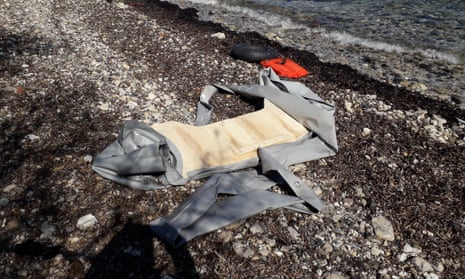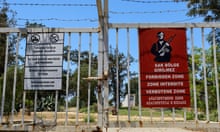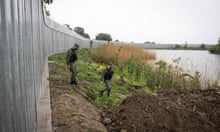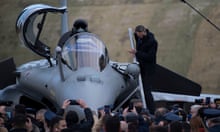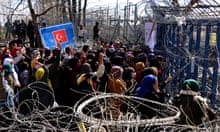Moses Kamaras stands at the foot of Lesbos’ Statue of Liberty, holding a pair of sodden shoes in his left hand, a rucksack hoisted over his right shoulder. The sun is in early ascent but the boat that has brought him – and 59 others – to this first bit of soil they will know as Europe is already the fourth to have landed on the island’s southern shores. By midday on Sunday two more vessels will have crossed from Turkey, carrying 127 Afghans to the north of the Aegean isle.
“I was really scared,” Kamaras, 34, from Sierra Leone, says, dazed and disoriented from the journey, his face covered by a surgical mask handed to him by the Greek police. “Our engine was really weak, we were in the boat for four hours and all the time I thought, what if I die,” he murmurs, raising a right hand with all five fingers missing, the price he says he has paid in torture for political opposition. “But I had spent six months in Istanbul. I had waited a long time for this day.”
Kamaras’ chance to traverse the sea came last week when, in a move of unexpected brinkmanship, Turkey’s president, Recep Tayyip Erdoğan, vowed to “open the doors” for migrants to enter Europe in retaliation for the EU failing to support Ankara in Syria.
While thousands headed towards Greece’s land frontier others, like Kamaras, made for the Turkish coast.
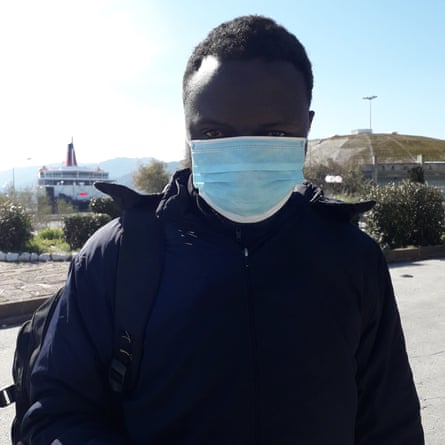
In echoes of the 2015 refugee crisis, when close to a million displaced Syrians entered Europe via Lesbos and adjacent Aegean isles, as many as 150,000 are now thought to have gathered on the country’s western shores in the hope of crossing.
By nightfall, ever growing numbers of women and children had reportedly joined those grouped on beaches opposite the outposts, despite the Greek government rushing to make a defensive ring of naval vessels and coastguard ships around the isles. An all-out drive to create crudely made inflatables has also been launched as traffickers amass in the area.
Sgt Panaghiotis Fykias, a veteran of that crisis, fears the worst. Seconded to the local police department’s immigration sector, Fykias makes countless trips patrolling Lesbos’ sealine every day in his battered Citroën.
On Sunday, what greeted him barely an hour after his 6.30am shift began was a surprise even for him. “One after the other the boats were coming in,” he says stopping at a beach strewn with the remains of rubber dinghies, life jackets, the inner tubes of tyres, blankets, food and clothes.

“To be honest I am not hopeful. Today, for the first time, I was taken back to 2015. The winds had dropped, the weather was perfect [for the crossing] but if these flows continue, the omens aren’t good. It’s explosive. There are 27,000 migrants here and residents have lost patience. The situation could easily get out of control.”
The first officer to arrive at the scene when reports emerged of a boat landing close to the Statue of Liberty – the showpiece sculpture within metres of the harbour of Mytilene, the island’s capital – Fykias encountered people as much elated as exhausted.
“There were pregnant women among them, lots of children, faces that looked so very tired,” he says. “But with coronavirus we have a procedure now, to hand out face masks, head count and put them on buses for Moria camp.”
In a sign of the brewing tensions on the island, that now appears to be anything but easy. Enraged at the sight of more migrants arriving locals moved to set up road blocks to prevent them even getting to the vastly overcrowded holding facility. In other unprecedented scenes, assailants rounded on volunteers with an aid organisation, beating them up in broad daylight. “If we let one bus through, it will be the beginning of the end,” Yannis Mastroyiannis, the community head of Moria’s hilltop village insisted.
Fourteen hours after landing in Lesbos, Kamaras had not moved further than a few meters away from the statue. His bus, like others carrying the newly arrived, had been held up by roadblocks and returned to a guarded area in the harbour.
It was his first taste of Europe’s promised land.
